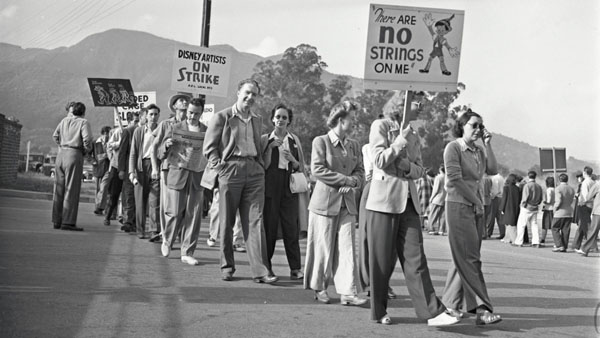
“Mr. Disney created more communists [than any other studio] with his substandard wage scales and the way he handled his people,” claimed the leader of the Conference of Studio Unions, Herb Sorrell.
One of the most colorful and controversial figures of the legendary Disney Strike of 1941 was Herb Sorrell. It was obvious that Sorrell’s rough and tumble ex-boxer ways did not endear him either professionally nor personally to Walt Disney, who was unused to the type of threats Sorrell utilized in his business dealings during other union negotiations.
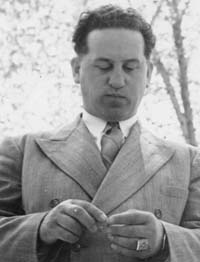
Herbert Sorrell, Screen Cartoon Guild, Disney Strike, c1941 (photo: Kosti Ruohomaa)
Sorrell under Bridges’ guidance had led two violent strikes in the Bay Area that he later bragged were secretly funded by the Communists. Sorrell was later responsible in the mid-1940s for several strikes that paralyzed Hollywood and pitted him against Screen Actor’s Guild President Ronald Reagan.
Herb Sorrell learned of the concerns and fears of the staff at the Disney Studios and was instrumental in leading them out on strike against the studio on May 29th, 1941.
On Wednesdays, the Leon Schlesinger Warner Bros. animators, apparently including Chuck Jones, joined their fellow animators by dressing up as characters from the French Revolution carrying on their shoulders a guillotine with an effigy of Disney lawyer Gunther Lessing who counseled Walt to stand strong against the strikers and not negotiate.
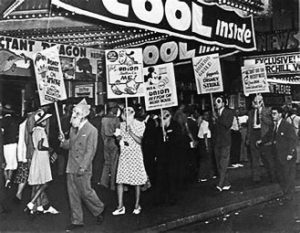 Despite the intensity of emotion (at one point outside the studio gates, Walt started taking off his coat and was ready to come to blows with animator Art Babbit before studio police stopped him), the Disney strike never emulated the bloody violence of strikes at other places.
Despite the intensity of emotion (at one point outside the studio gates, Walt started taking off his coat and was ready to come to blows with animator Art Babbit before studio police stopped him), the Disney strike never emulated the bloody violence of strikes at other places.
When a rumor circulated that paid goons were going to beat up the strikers, Sorrell sent a gang of Lockheed aircraft mechanics with monkey wrenches to guard the tents of the striking animators which were pitched on the land across from the Disney Studio that later became St. Joseph’s Hospital. It turned out to be merely a rumor and no damage was done.
Walt told a newspaper columnist that he was “convinced that this entire mess was Communist inspired and led” and that “I’m not licked; I’m incensed” and that “I am thoroughly disgusted and would gladly quit and try to establish myself in another business if it were not for the loyal guys who believe in me…..I have a case of the D.D.s — disillusionment and discouragement.”
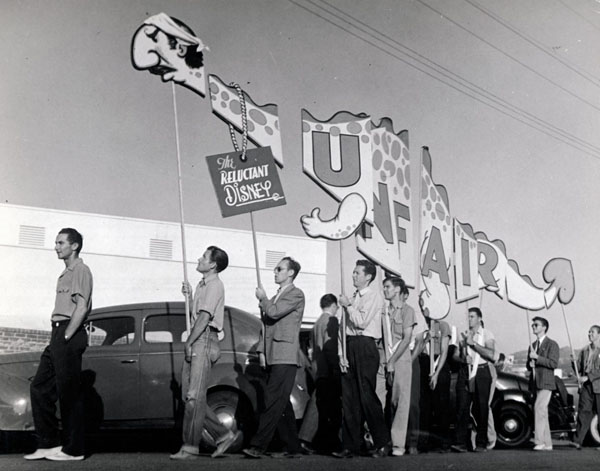
I ran across Sorrell’s description of what he saw during the strike and for your enlightenment, here it is a first hand account of what it was like decades ago when the Disney strike was happening.
From the testimony of Herbert K. Sorrell, “Jurisdictional Disputes in the Motion-Picture Industry,” Hearings before the House Committee on Education and Labor, 80th Congress (1948):
“It was particularly picturesque because these artists insisted on depicting everything on their picket lines. They had all kinds of signs. The best of them, it was their duty when off the picket line to make gags and signs.
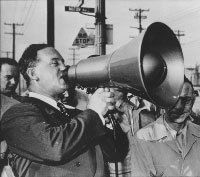 “Gunther Lessing was Mr. Disney’s attorney, and all of the dealings I had were with Gunther Lessing. I had never met Disney but once. Gunther Lessing was a redheaded attorney who bragged that he was counsel for Pancho Villa. I told him, of course, I never had heard of Pancho Villa ever winning a legal victory. I thought it was the other kind, and I did not see where he got any glory out it, but he still brought it up to everyone who met with him.
“Gunther Lessing was Mr. Disney’s attorney, and all of the dealings I had were with Gunther Lessing. I had never met Disney but once. Gunther Lessing was a redheaded attorney who bragged that he was counsel for Pancho Villa. I told him, of course, I never had heard of Pancho Villa ever winning a legal victory. I thought it was the other kind, and I did not see where he got any glory out it, but he still brought it up to everyone who met with him.
“The kids hung an effigy of Gunther Lessing, with the red hair, in front of the gate upon a pole. Disney had made a picture of something about a dragon — The Reluctant Dragon. One day the picket line assumed a dragon three or four blocks long, the head weaving, with Disney’s face as the dragon’s face. There were all kinds of things like this.
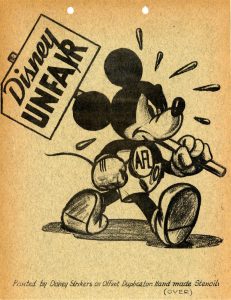 “Then, lo and behold, about 5 o’clock would come along the Schlesinger group in automobiles decorated all about Disney. The fact of the matter is, Mr. Schlesinger’s artists, I think, spent all their time making up gags about Disney, so that when work was out they picketed him with them.
“Then, lo and behold, about 5 o’clock would come along the Schlesinger group in automobiles decorated all about Disney. The fact of the matter is, Mr. Schlesinger’s artists, I think, spent all their time making up gags about Disney, so that when work was out they picketed him with them.
“We had a sound wagon there, and we talked over the sound wagon, and we had a sound system which we installed across the street on a side hill. Every morning we would picket, the kids would picket from 7:30 to 9, and then they would go over to this side hill and from 10 to 11 or 11:30, we would talk to them on a loud speaker system, and of course they could hear in Disney’s what we were saying across the street.
“Also, on this hill we had a cafeteria set up, the carpenters built tables, and in California it was summertime, it was all sunshine, and it did not have to be protected from the rain. So they built tables and the culinary workers furnished us a chef, and we served lunch.
“At dinnertime we served dinner at 6 o’clock after the mass picket line would go off, after the workers had gone through. And then the musicians many nights would send down a truckload of musicians and they would play and these kids would dance in the street in front of the gates.
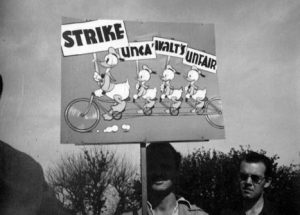 “They kept busy all the time. The average age was less than 25. They became the most enthusiastic strikers I have ever seen in my life.
“They kept busy all the time. The average age was less than 25. They became the most enthusiastic strikers I have ever seen in my life.
“Mr. Disney, when he could not get any police from the city, decided to hire 50 private police from outside the city. These fellows came in and the usual rough tactics — began to push these kids around, and some of the young kids were not to be pushed around, they were strapping young men. So I ordered them all inside. I said, ‘You are working for Disney, you get inside.’
“We almost came to blows there. But the Burbank police joined me in ordering the people that Disney had hired inside the property line, so they lined up inside the gate; they were helpless, nothing happened, and there was still no violence.”
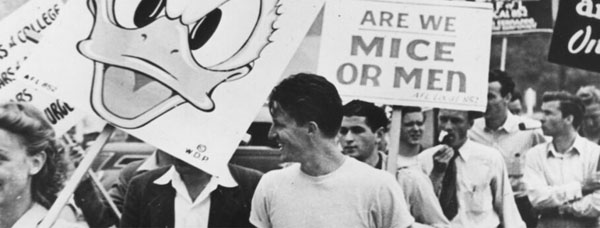


 Jim Korkis is an internationally respected animation historian who in recent years has devoted his attention to the many worlds of Disney. He was a columnist for a variety of animation magazines. With his former writing partner, John Cawley, he authored several animation related books including The Encyclopedia of Cartoon Superstars, How to Create Animation, Cartoon Confidential and Get Animated’s Animation Art Buyer’s Guide. He taught animation classes at the Disney Institute in Florida as well as instructing classes on acting and animation history for Disney Feature Animation: Florida.
Jim Korkis is an internationally respected animation historian who in recent years has devoted his attention to the many worlds of Disney. He was a columnist for a variety of animation magazines. With his former writing partner, John Cawley, he authored several animation related books including The Encyclopedia of Cartoon Superstars, How to Create Animation, Cartoon Confidential and Get Animated’s Animation Art Buyer’s Guide. He taught animation classes at the Disney Institute in Florida as well as instructing classes on acting and animation history for Disney Feature Animation: Florida.
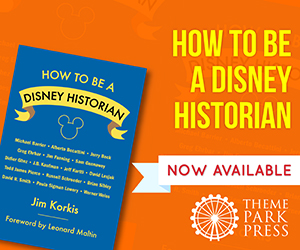



















































I love angry Mickey carrying a picket sign.
“Sorrell was later responsible in the mid-1940s for several strikes that paralyzed Hollywood and pitted him against Screen Actors Guild President Ronald Reagan.”
This is a misleading; Reagan didn’t become SAG president until 1947. Herb Sorrell led the famous 1945 Conference of Studio Unions strike that practically shut down Hollywood studios for a little while; CSU also struck briefly in 1946. But these were before Reagan’s tenure as SAG leader.
Reagan was a SAG VP until President George Montgomery and VP Franchot Tone stepped down to produce. The CSU Strikes of 1945, 46 and 47 were all part of one continuous conflict with IATSE and the Studios. Read my book Drawing the Line.
It should be noted, in view of Walt Disney’s later statements to Congress, that Herbert Sorrell was never a Communist, and in fact the Communist Party actively opposed the strikes he led on behalf of the Conference of Studio Unions in the mid-’40s.
Those are some very funny pictures, but behind the cartoony placards and carnival attitude that Sorrell describes, the strike was serious business. Walt insisted that he could personally resolve any problems his employees had yet refused to acknowledge legitimate grievances. It is true that the company went into debt because of the loss of the European market due to the war and the cost of building the new Buena Vista studio, but after the company went public in 1940 (which Roy Disney had been urging for years) they were able to pay off their debts and had millions in available capital; and the blocks of shares that Walt, Roy and their wives retained for themselves made them personally wealthy. So the idea that Disney couldn’t afford pay increases for its staff was a bald-faced lie. Walt himself rarely addressed the strikers directly, leaving that task to intermediaries like George Drake and the unpopular Gunther Lessing (who would later be made a Vice President of the company), and he was away in South America when the strike was finally resolved. The workers who remained loyal to Disney received everything the strikers had demanded, while those who had taken part suffered professionally.
Walt Disney, like Henry Ford, failed to understand that a union contract can be negotiated in the same spirit of goodwill and respect as a commercial contract between two companies. The strike may be one of the few black marks on Disney’s record, but as far as I’m concerned it was a big one.
Then again, like every other businessmen, he didn’t believed in unions. Yet he thought of his staff as a family.
I found it interesting that the Schlessinger artists got involved! Did this actually escalate throughout the animation industry, no matter what the studio?
All the Hollywood animators got involved in the Disney Strike, because they all knew Disney’s was the ultimate battle. Chuck Jones and Friz Freleng were there, Animators from Walter Lantz and MGM as well as Schlesingers were there. It was animations own version of the civil war.
I realize that the Disney studio was by no means run perfectly, what organization has ever been?
Having said that, I’m not convinced that Herbert Sorrell was by any means an angel or someone driven to ensure that people were treated fairly. His tough negotiation tactics seems to have targeted Hollywood as a whole. Collective Bargaining has its merits, but when the person orchestrating the strikes systematically targets Hollywood as a whole, the cause ceases to appear as the noble as Sorrell implied that it was, but rather a case of self-aggrandizement and personal gain.
For anyone who is familiar with the history of the Disney studio you should also be familiar with the struggles that it had to endure. Throughout most of the early Pre-Feature days, Walt Disney had actually paid many of his employees like Ub Iwerks, Ham Luske, Art Babbitt, at higher pay rates that either He or Roy were making at the time. His primary concern being improving the quality of the pictures over profiting off of them. Aside from that there is the fact that Charles Mintz had stolen virtually the entire studio, and nearly all of its assets due to a falling out leading up to new contract negotiations. A couple of years later Pat Powers had also taken advantage of the Studio’s contractual obligations and ended up seducing Ub Iwerks with a lucrative contract to abandon Walt to start his own venture, temporarily handicapping the studio at the time. Then there was the matter that throughout the depression Walt Disney provided many high paying jobs to artists who otherwise would have most likely been unable to find work in their chosen field. All while continuously raising the high water mark as to what Animation was capable of. Why wasn’t anyone bringing up those facts at the time?
The studio had made a fortune with Snow White. A large chunk of that money was spent on building the new animation campus. The rest of the money was used to fund the production costs of Fantasia, Bambi, Pinnochio and Dumbo in addition to all of the shorts in production. Had the war not happened, there probably would have been little to no reason to strike. Revenues off of the subsequent features would have more than compensated all involved. With escalation of War engulfing the world as a whole, foreign revenues were dried up. No one at the time could have predicted the unfolding of world affairs when production of those projects were green lit.
Hindsight is always 20/20. I’m sure that Walt and Roy could have made better decisions and averted having to deal with the strike isn the first place. But in the House Un-American Activities Committee hearing Walt Disney testified that Herbert Sorrell, swore “he would make a dust bowl out of my plant if he chose to.”. Having Dealt with Charles Mintz, and Pat Powers two people who had already attempted to do just that, I can understand why Walt chose to stand his ground and Fight back against someone threatening to take everything away from him yet again.
i read a story in one of the Disney Biographies that Herb Sorrell marched into Disney’s office one day and announced; – “this studio’s ours now.” This may be the one time they met that Sorrell was alluding to. If this story is true – and it would need to be verified – it would mean that Disney Studios went through an attempted communist take over, and that Herb Sorrell’s ultimate goal was to take Disney’s studio away from him and turn it into a worker’s co -opperative. It is significant to me that Sorrell was not an animator himself and had no personal investment in the industry.
As I say, I don’t know if the story i read it true, what we do know is that there a significant number of Disney loyalists who didn’t want the strike, who didn’t want an outsider poking his nose into their business.
Herb Sorrell Was my Great Grandfather. What is left out of this article is the fact that he had a painting business and unioinized the cartoonist out of a moral drive to help. He was blacklisted and lost everything. It caused pain for generations. Unfortunatly, what happened was never disscused. My grandmother was intrviewed about her memories by USC in the early 80’s but i have not found those interviews. Disney was a businessman of the time. He did not really care about the workers. I am not a fan of unions. they become self serving, however during this period they served a purpose. .
I need to get in touch with you if Herbert Sorrell was infact your grandfather. I hope you can email me at mgrubie@gmail.com
You are wrong about Disney you can look it up on YouTube he testified that his people came to him and he didn’t want to be in the union and they wanted a vote. Sorrel was a communist using typical communist tactics to take over and push unionization. Look up the clip on YouTube Disney testifying at the congressional hearing on un-American activities
You don’t know what you’re talking about.
I’m doing extensive research on Sorrell. Sorrell was never a communist, but he would spend their money for the working union members of the CSU. He didn’t care where he got the money from, not to mention, Sorrell never was paid off or took a bribery. He was one bad mother that is a hero in my eyes. The threat of communism took him down. These are his words, “In the motion picture industry, people who didn’t deal were not liked. They tried to be a good fellow with you, but if that didn’t work, they’d try to get something on you. If that didn’t work, they tried to bump you off or call you a communist. I was well known as a communist, a fellow traveler, or what have you. This was only because I refuse to make deals favorable to my pocket, and favorable to the employer’s pocket, as against the men I represented.”
If Sorrell and the CSU would have prevailed we would not have the decreasing middle class that we are today.
Thank you.
Im playing Mr Sorrell in a movie about Regan.
Great insight.
Disney testified that Sorrell was a communist and the communists had infiltrated Hollywood labor unions Disney’s people did not want to be in the union and Surrel pushed the strike to smear Walt Disney as retribution against him for pushing a vote. Reagan ran for president because he knew that Hollywood was being taken over by communist. As we see today.
I think you need to do a little bit more research If you follow the story all the way through it ends with McCarthy and his false accusations just as Disney was doing to smear organizing efforts of the workers organizing efforts and rise up against the Corporation, which is what is needed now.
I agree with Nelly my Dad a Famous T.V. Photographer told me about the Strike at Warner Bros. He was a UNION Man. I do believe there were Communists in the Entertainment Industry everyone was always outraged at the McCarthy era. A real pushback witch hunt but what amazed me with what is going on today and after seeing the Movie Reagan . Communism was out there way back. Early 1900’s. When Russia went down and so did the Chinese.Yes Mc Carthy was RIGHT!!!!!